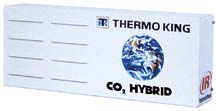Thermo King, in Minneapolis, MN, is using cryogenics technology to create what the company said is cleaner, quieter, and more efficient temperature control. The cryogenics transport refrigeration systems use liquid CO2, eliminating the need for ozone-depleting commercial refrigerants.
“Because it doesn’t rely solely on diesel fuel, the cryogenics series have enabled Thermo King to meet its commitment to improving the environment,” said Jay Seshadri, vice president of Emerging Technologies. “European customers have been using trailer units successfully for more than four years now. So we recently expanded the series to include two units for trucks, the ST-CR 300 and a CO2 hybrid unit.”
Either cryogenic truck unit enables food distributors with multiple stops to increase cooling capacity while addressing food safety and environmental concerns, said Seshadri. In addition to rapid temperature pull-down, the systems contain fewer moving parts than conventional equipment, resulting in reduced noise levels and lower maintenance requirements, he added.
“Well suited for urban grocery-delivery companies, florists, and snack and beverage distributors, the systems help customers not only comply with local noise level regulations, but depend on quick temperature recovery after each delivery,” said Seshadri.
The ST-CR 300 runs completely on the cryogenic system, using liquid CO2 as a substitute for diesel fuel. Specifically designed for urban markets with multistop delivery rounds, the unit stores cooling capacity in the form of liquid CO2 in a vacuum insulated tank.

The SB-III CR unit for trailers is said to have 98% fewer moving parts than conventional systems.
“Faced with Hazard Analysis and Critical Control Point (HACCP) requirements and stricter industry demands, our customers need extremely tight temperature control throughout the entire cold chain,” explained Seshadri. “With the cryogenics units, there is very little variation from the set temperature, even on multistop deliveries where the door is constantly opened and closed.”
For more information, visit www.thermoking.com (website).
Publication date: 08/05/2002


Report Abusive Comment